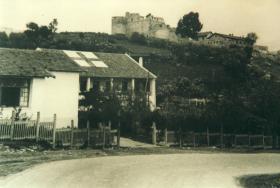Charles Granville Rob was born in 1913, the son of a family doctor, at Weybridge, Surrey. His mother was descended from Edward "Grog" Vernon, who introduced the rum ration to the Royal Navy.
Charles was educated at Oundle before going up to Cambridge in 1931 to read Medicine at St John's College. Whilst at Cambridge he joined the University Air Squadron and obtained his 'wings' and a Reserve Commission in the RAF before graduating in 1934. After completing his clinical studies at St Thomas's Hospital in London, he graduated MB in 1937, spending two years as an intern in surgery before becoming a Fellow of the Royal College of Surgeons.
When the Second World War broke out in 1939, Charles Rob was a Junior Surgical Resident at the Royal Victoria Hospital in Montreal. He returned to England and St Thomas's where, during the Blitz, the hospital was hit by numerous bombs but the surgical work continued, often in the cellars by candle-light and using water heated by primus stoves. He obtained his Mastership of Surgery at Cambridge and, when St Thomas's took over Hydestile Hospital, near Godalming, Surrey, he became Resident Assistant Surgeon.
In April 1942, Rob enlisted in the Royal Army Medical Corps, volunteered for Airborne Forces and after qualifying as a parachutist was posted to 16 Parachute Field Ambulance where he commanded No 1 Surgical team. 16 Para Field Ambulance was sent to North Africa in late 1942, as part of the 1st Parachute Brigade. Rob's surgical team was attached to 1st Parachute Battalion for an Airborne operation at Souk-el-Arba on 16 November 1942, in support of No 1 Section of 16 PFA, commanded by Captain D Wright.
1st Battalion were tasked with occupying an important road junction around Beja, about 90 miles west of Tunis. The 1st Battalion occupied the town but soon afterwards on 20 November, the German Luftwaffe bombed the area and caused a number of casualties and wounded civilians which were treated by the medics of 16 PFA.
Lieutenant Robb performed over 150 operations with Lt Wright acting as Anaesthetist. As he worked, a bomb fell outside the building fracturing Lt Rob's left tibia and kneecap. In spite of these injuries, he carried on working. The next day, still wounded and after operating on about another twenty casualties, he donated a pint of his own blood as the supply of plasma was exhausted. Lieutenant Rob's results as a surgeon were arguably the best ever by a Surgeon in a Parachute unit. It may be that his prior experience as a surgeon at St. Thomas' Hospital during the blitz gave him a head start in dealing with traumatic injuries. He is known to have performed the potentially lifesaving operations on both (later Brig) James Hill and 1st Battalion Adjutant, Miles Whitelock. For his efforts during this period Lieutenant Rob was awarded the Military Cross.
After recovering from his injury, Rob never served in an Airborne unit again, but saw service in Sicily and Italy in command of a Field Surgical Unit. He was based near Trieste when the Second World War ended, and left the Army in 1946 in the rank of Lt Col.
On demobilisation, Rob was appointed to the Surgical staff of St Thomas's at a time when 'to get one's own teaching hospital' was the pinnacle of a young Consultant's ambition. In 1950, he became Professor of Surgery at St Mary's Hospital, in London. He also became Consultant Vascular Surgeon to the Army.
At St Mary's, Rob set about establishing a programme of vascular surgery. The first deep freeze arterial bank was set up in 1949, and freeze drying soon followed. In 1954, the prevention of cerebral thrombosis and stroke was made possible by Rob and his team by the removal of the short, narrow, diseased segment of the carotid artery before its disease could spread to the brain. Interested visitors came from all over the world to see the work being done at St Mary's. Sir Winston Churchill, on the recommendation of Lord Moran, consulted Rob, as did the ruling family of Saudi Arabia.
For all his commanding presence, Charles Rob had an informal and charming personality, and a practical demeanor. At a meeting of the British Medical Association in 1957, discussing the control of pain in a gangrenous limb, Rob told his audience: ‘The best treatment for the condition is rest. The best way to rest is to sleep. The best way to get sleep is to relieve pain and the best way to relieve pain is to give whisky - big and rapid doses up to the maximum tolerance of the individual’.
In the 1960’s he moved to the United States and held a number of important medical positions. Charles Rob died in August 2001 aged 88.
With assistance from Niall Cherry
Read More

Latest Comments
There are currently no comments for this content.
Add Comment
In order to add comments you must be registered with ParaData.
If you are currently a ParaData member please login.
If you are not currently a ParaData member but wish to get involved please register.